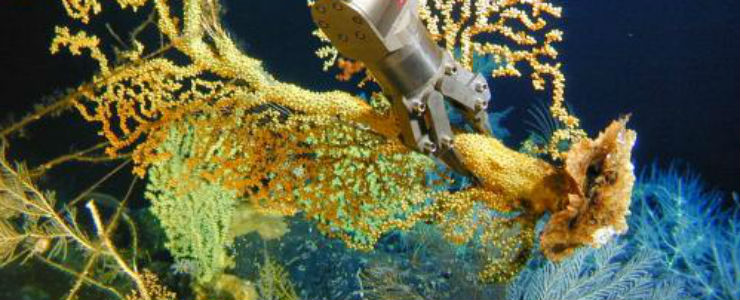Oceanography and Ocean Processes
Scientists in this cluster group explore the oceans to gain deeper understanding of their chemical, physical, and biological components. From Monterey Bay to Antarctica, they travel on ships that traverse the ocean surface from the highly productive coastal waters to the open ocean, and and probe the surface, mid-water and deep sea. Their research has enabled scientists to view the processes that affect circulation and productivity in the oceans with a new perspective. Intellectual strengths within this group include biological oceanography, marine microbial ecology, chemical oceanography, marine biogeochemistry, physical oceanography and climatology, and biological-physical modeling of the marine environment.
From a human perspective, the coastal seas are among the most important and vulnerable areas of the world's oceans. We use these areas for food supplies, as most of the world's fish catch is taken from coastal waters and adjacent upwelling regions. Phytoplankton are the first link in the ocean food chain that sustains fish, marine mammals, seabirds, and humans. As a result, phytoplankton blooms largely determine biological variability in coastal ecosystems and especially in Monterey Bay.
Mounting evidence suggests that the natural cycles of bloom variability and species composition are being altered on a global scale by human activities, including input of both essential nutrients and toxic contaminants, manipulation of river flows, and species translocation. The first step to more efficiently protect ocean ecosystems is to gain knowledge on the intricate relationships between physical, biological and chemical processes in the ocean.
Faculty (Professors and Adjuncts) and Professional Researchers affiliated with the Oceanography and Ocean Processes Cluster Group:
Patrick Chuang, Professor of Earth & Planetary Sciences: Clouds, aerosols and climate.
Christopher Edwards, Professor of Ocean Sciences: Physical oceanography, numerical modeling of coastal- and basin-scale dynamics.
Jerome Fiechter, Associate Professor of Ocean Sciences: Study of marine ecosytems using coupled physical-biogeochemical models.
Raphael Kudela, Professor of Ocean Sciences, : Ecological modeling and remote sensing, satellite oceanography, phytoplankton ecology and harmful algal blooms.
Phoebe Lam, Assosciate Professor of Ocean Sciences: Particle geochemistry, biological carbon pump, cycling of trace elements and isotopes, chemical oceanography.
Carl Lamborg, Associate Professor of Ocean Sciences: Mercury, marine biogeochemistry, biological pump.
Matthew McCarthy, Professor of Ocean Sciences: Organic geochemistry, marine organic geochemistry, global biogeochemical cycles.
Andrew Moore, Professor of Ocean Sciences: Physical oceanography, numerical ocean modeling; air-sea interactions; ocean prediction.
Adina Paytan, Professor of Earth & Planetary Sciences: Biogeochemistry, paleoceanography, environmental and aquatic chemistry.
Greg Rau, Researcher Recalled: Carbon / CO2 cycling, management , mitigation, and use; policy and societal action.
Marilou Sison-Mangus, Associate Researcher: Microbial ecology, Evolutionary biology, Biological Oceanography.
Jonathan Zehr, Professor of Ocean Sciences: Aquatic microbial ecology; biological oceanography.

